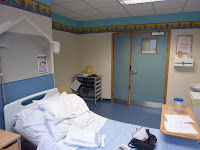I have set this post to appear online at precisely 11.11am on the 11/11/11. If I could define it down to the second, believe me I would. Because I am lame that way. Anyhow. On to the story...
***
In January 2010, a chain of events was set in motion which led to the first of my many trips to hospital and, incidentally, the first time I tried sushi. Of the two experiences, I preferred the latter. From what I've seen, hospital visits rarely come with a side of
pickled ginger.
And I love pickled ginger.
Sadly I can no longer remember the date in question, but I think it was around the 18th January; I was back at university and, being a studious and dilligent character, I had spent the entire day sitting in my room reading books about Old English poetry. Consequently, I couldn't quite work out why, ever since I'd woken up, my heart had been beating as fast as though I'd just run for the bus.
At about four o'clock, I used the excellent
online stopwatch to work out that my heartrate was around 140 beats per minute. So I decided to do what any sane individual would do when their local doctor's practice is a two-minute walk away. I called
NHS Direct.
NHS Direct sent me to the doctors. Feeling like a bit of an idiot, I ambled into the reception, was immediately rushed in to see the nurse (ever wanted to skip the queue? Just develop heart problems!)* and found myself wired up to an EKG, which looked rather like some kind of creepy mechanical chest octopus. I sat there for a few minutes and the nurse agreed that yes, my heart was rather speedy. Then I was sent to a doctor, who took a look at the creepy mechanical chest octopus printout and agreed that yes, my heart was indeed rather speedy.
So the doctor sent me to the hospital. My very nice college booked and paid for the taxi to take me to A&E and I grabbed my very nice friend Cherry to accompany me.
"Heart problems" is one of those magical phrases that gets you rushed through A&E much faster than, say, a mere broken bone or accidental breadknife incident - although of course it does mean that, as an entirely healthy-looking young person, you're liable to get a few evils from the folk who've been waiting there, oozing gently, for an hour.
Once I went through to see a doctor, the fun really started. Immediate assumptions were that either:
1) I must be having a panic attack.
or
2) I must have taken some kind of exciting illicit substance.
I think that option 1 was rapidly discounted due to the carefree nonchalance with which I munched my way through a packet of McCoys** and giggled as the doctor on duty made me blow through a small tube and massage my neck in an attempt to get my heartrate down. Of course, no matter how many times I insisted that option 2 was not an option, they refused to believe me.
Eventually they admitted defeat and sent me deeper into the hospital, where I got a whole bed to myself. Yay! I had a smorgasbord of blood tests and was wired up to another heartrate monitor which, annoyingly, was set to beep frantically any time my heartrate went over 140bpm. As it spent the whole time hovering around the 140 mark, this quickly got extremely irritating.
Cherry kindly volunteered to read aloud my book of translated
Old English poetry to me, which resulted in her learning quite a lot of new and exciting vocabulary, like "seraphim", "fetters", and "vassal". Quite inexplicably, she lost interest only partway through a poem.
I sat in the hospital, waiting for my blood test results to come back, until about 11 o'clock at night. The doctors weren't sure whether I'd have to stay overnight, and so Cherry, as well as looking after me very well, (although I can never forgive her lack of interest in Anglo-Saxon literature) also had the fun job of phoning my parents and boyfriend, to let them know what was going on.
Finally, late at night, having had no dinner, it was announced that all my blood tests had come back fine, they had no idea what the hell was wrong with me, and that I should go home. If my heartrate was still fast in the morning, I was told to go back to the doctors.
It was good to be able to phone my parents and reassure them that I was not on death's door, but attempting to go to sleep with a heartrate of 140 is virtually impossible, and I was not reassured when, the next day, the doctor incredulously asked me "they let you go home from hospital with a heartrate of 140 and no medication?", with a look of horror on his face.
But more of that at a later date...
UPDATE: Click here to read my next post about getting a diagnosis. Or
click here to go back and read more about my initial symptoms.
________________________________________________________________________
*N.B. This doesn't work as well in the supermarket.
**Incidentally, I hadn't noticed until recently that McCoys advertise themselves as "man crisps". WTF. Seriously, are their marketing team like five years old?
Wikipedia, my one true love, tells me that McCoys are, and I quote, 'promoted by United Biscuits*** "as the only overtly male-targeted crisp brand"'. Don't believe anyone would say something that stupid, let alone base an ad campaign around it? Here's the
website.
***Words fail me.




